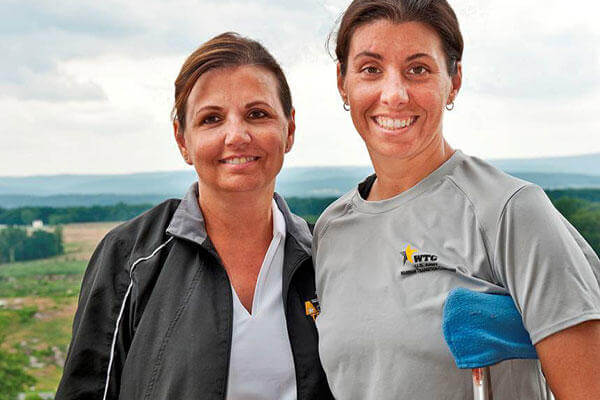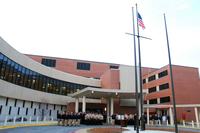Since 2001, nearly 50,000 military families have received the call that their loved one has been injured in Afghanistan or Iraq. Within hours, these family members have dropped everything in the rush to be by their injured servicemember's side in a faraway military hospital.
They may be there a few months or a few years, sacrificing for their wounded warrior and their country. And for that, they’re fired.
Paulette Mason was fired by email. When her daughter Stefanie was severely injured in Afghanistan, Paulette rushed to Walter Reed National Military Medical Center. She took a leave of absence from her job as a corporate executive, but eventually her employer gave her an ultimatum: Choose between her daughter or her job.
Stefanie was still hospitalized, still completely dependent on Paulette to help her bathe, dress and eat. Stefanie needed to be taken to 7-hours-a-day worth of appointments and reminded to take medication. There was a mountain of paperwork to manage and more.
Paulette chose her daughter -- and lost her job.
Siobhan Fuller’s boss came to Walter Reed and fired her right there in the hospital lobby. Meanwhile, her son was in ICU fighting for his life after losing both legs.
Compared to that, Julie Keys considers herself lucky. After she used up her vacation and sick time, her co-workers donated their vacation time to her. When that ran out, her employer put her on short-term disability.
In the end, they, too, let her go. Julie appreciated the support she did receive while she cared for her son, who lost both legs and a hand in the aftermath of a roadside bomb. But she was still unemployed.
I hear these stories over and over again at the nonprofit I work for that assists injured servicemembers and their families. While the Family and Medical Leave Act (FMLA) guarantees 26 weeks of unpaid leave for family caregivers of injured servicemembers, many caregivers don't know their rights under FMLA, or don't have the energy or resources to take on an employer determined to duck the law.
FMLA doesn't protect everyone, either -- it's only for employees who meet certain conditions and who work for employers with more than 50 employees. Everyone else slips through the cracks. And while 26 weeks sounds like a long time, the reality is that in six months, a seriously injured servicemember has only just begun to recover.
After injured veterans go home, some are unable to work, and no family can live on veteran disability payments. In those cases, caregivers must continue to provide care while assuming the role of primary breadwinner. So at that point, they either have to find another job (with a resume that now has a years-long gap), or go back to school to prepare for a job that's better suited to their changed circumstances.
Caregivers who are military spouses can get limited job and education assistance from government and private resources. But when the caregiver is a parent, sibling, girlfriend or close friend, they get virtually no help at all.
The parents' situation is especially hard. Typically, the parents of young servicemembers are in their forties. According to AARP, when people that age leave their jobs to care for a relative, they lose on average $325,000 in lifetime income, including lost wages, Social Security and pensions.
Military families who've suffered an injury have done their part. They've sacrificed their physical, emotional and financial well-being for this country. American employers must do their part as well, making sure that caregivers have a job to come home to. It would be nice if we could count on every employer doing this simply because it's the right thing to do. But experience shows we can't.
To fix that, we can start by raising awareness among caregivers of their rights under FMLA. We can hold employers to account when they don't live up to their FMLA obligations. Lawyers can help by donating their services and journalists can help by publicly exposing employers who shirk their legal duty to these unsung heroes.
But FMLA can never deliver what's really needed: Job protection for every family caregiver of an injured servicemember, no matter who their employer is. This is what a grateful democracy that believes in shared sacrifice does.
We already do it for reservists and National Guard members when they’re called up to serve on active duty, thanks to the Uniformed Services Employment and Re-employment Rights Act (USERRA). When they return home, by law their jobs are waiting for them (at least on paper).
We should do no less for caregivers who are essentially drafted into the service of our country when their military loved one is injured. This requires action on the part of Congress, so contact the president and your representatives in the House and the Senate now. More than 11 years into the Long War, it’s shameful that our country has so far failed its responsibility to our injured veterans by failing to fully protect their caregivers’ jobs.
Photo by Charles Lee.
-- Kristin Henderson is communications director for the Yellow Ribbon Fund, and a military spouse, journalist, and author. Her books include the thriller The Zargari Incident, and While They're at War: The True Story of American Families on the Homefront. The views expressed here are her own.




























